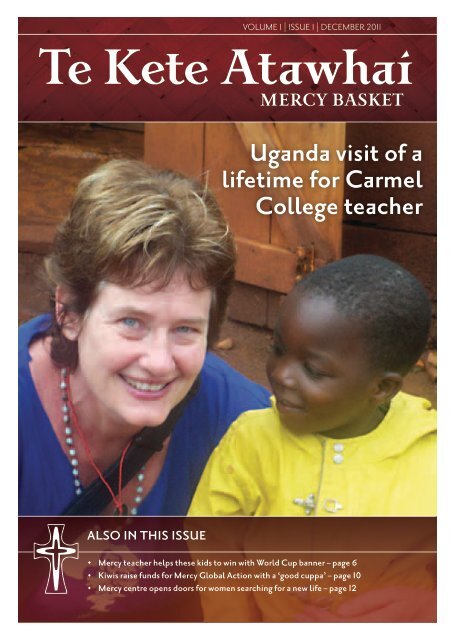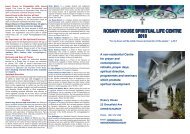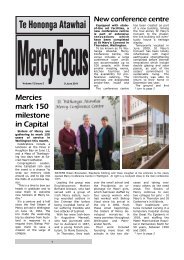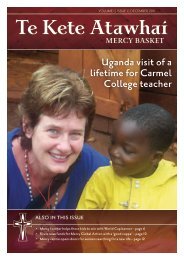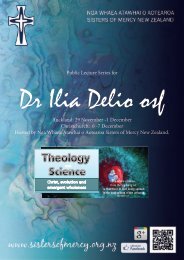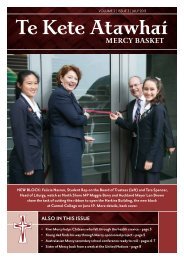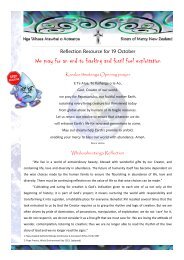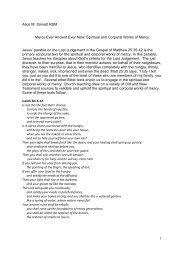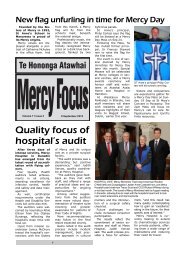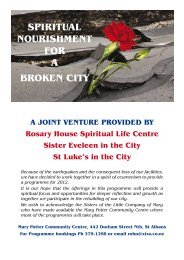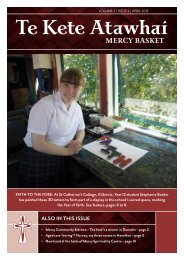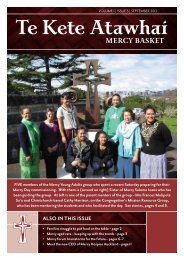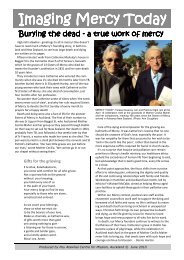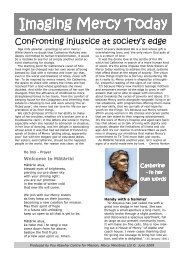Te Kete Atawhai - Sisters of Mercy of Aotearoa New Zealand
Te Kete Atawhai - Sisters of Mercy of Aotearoa New Zealand
Te Kete Atawhai - Sisters of Mercy of Aotearoa New Zealand
You also want an ePaper? Increase the reach of your titles
YUMPU automatically turns print PDFs into web optimized ePapers that Google loves.
Volume 1 | Issue 1 | december 2011<br />
<strong>Te</strong> <strong>Kete</strong> <strong>Atawhai</strong><br />
<strong>Mercy</strong> bAskeT<br />
also in this issue<br />
uganda visit <strong>of</strong> a<br />
lifetime for Carmel<br />
College teacher<br />
• <strong>Mercy</strong> teacher helps these kids to win with World Cup banner – page 6<br />
• Kiwis raise funds for <strong>Mercy</strong> Global action with a ‘good cuppa’ – page 10<br />
• <strong>Mercy</strong> centre opens doors for women searching for a new life – page 12
Keeping hope alive in our<br />
world today<br />
tena koutou, nga mihi ataWhai – greetings to all in mercy!<br />
As Congregation Leader <strong>of</strong> the <strong>Sisters</strong> <strong>of</strong> <strong>Mercy</strong> in <strong>New</strong> <strong>Zealand</strong> and<br />
Chair <strong>of</strong> <strong>Mercy</strong> Ministries Trust, we are delighted to welcome this first<br />
edition <strong>of</strong> <strong>Te</strong> <strong>Kete</strong> <strong>Atawhai</strong>, <strong>of</strong>fering a quarterly snapshot <strong>of</strong> some <strong>of</strong> our<br />
current ministries.<br />
In a year that began with the devastation <strong>of</strong> a second major<br />
earthquake in Christchurch and which ended with the excitement<br />
<strong>of</strong> World Cup Rugby, mercy has remained the business <strong>of</strong> our lives,<br />
working to keep hope alive and to make a difference where it is most<br />
needed.<br />
In just a few pages, we glimpse here some <strong>of</strong> our major ministries<br />
at work. Education is reflected in a sabbatical visit by a teacher from a<br />
<strong>Mercy</strong> college to Uganda, helping to renovate and update classrooms<br />
in that nation and returning to remind her own students <strong>of</strong> how<br />
blessed they are to live in this land <strong>of</strong> plenty. There are short pieces<br />
from two <strong>of</strong> our colleges in Wellington, focusing on students’ outreach<br />
to those struggling from one need or another.<br />
Healthcare is highlighted in how one <strong>of</strong> our aged care facilities has<br />
worked to develop a uniquely <strong>Mercy</strong> approach in the care it <strong>of</strong>fers,<br />
tailored to the needs <strong>of</strong> individual residents and helping them to know<br />
that, despite the losses and limitations <strong>of</strong> age, they are still persons for<br />
whom choice can make a difference as each new day unfolds.<br />
And community development is featured in two stories from an<br />
agency that is empowering women who have felt marginalized to<br />
make choices <strong>of</strong> their own, moving forward and helping their whanau<br />
to do the same. In future issues we look forward to covering activities<br />
from other <strong>Mercy</strong> Missions especially those in Tonga and Samoa.<br />
<strong>Te</strong> <strong>Kete</strong> <strong>Atawhai</strong> is a basket filled with many rich blessings, as <strong>Sisters</strong><br />
<strong>of</strong> <strong>Mercy</strong> and their lay companions share the mercy they have received<br />
to enrich other lives. As the Young Vinnies leader at St Mary’s College<br />
notes in this issue, time is one <strong>of</strong> the most valuable resources we can<br />
give to another, and making a difference to other lives can be ‘loads <strong>of</strong><br />
fun’ as well.<br />
Wherever you are, and however you are called to share your gifts,<br />
we wish you all the blessings <strong>of</strong> knowing what it is to give and receive<br />
mercy.<br />
Ma te Atua koe e manaaki e tiaki.<br />
Naku iti noa na<br />
nga Whaea atawhai o aotearoa sisters <strong>of</strong> <strong>Mercy</strong> new <strong>Zealand</strong><br />
Congregational support for charitable works - 2010/11<br />
Congregation’s contributions to charitable works<br />
Support <strong>of</strong> Congregation’s facilities 992,549<br />
Charitable works outside Congregation 255,208<br />
Pacific missions 558,157<br />
1.805,914<br />
Charitable funds administered within Congregation<br />
Distribution from charitable funds 26,730<br />
Financial support provided from Congregation’s resources<br />
Funds raised by Congregation’s facilities<br />
1,832,644<br />
Fundraising, grants and donations 4,213,922<br />
Congregation’s total support for charitable works $6,046,566<br />
COVER IMAGE: Carmel College teacher Michelle Wansink, with three-yearold<br />
Nathan, son <strong>of</strong> a local artist in the village <strong>of</strong> Bujagali Falls in Uganda,<br />
where Michelle worked to refurbish classrooms during her visit to the African<br />
nation earlier this year. “Nathan was very bright and active, and was my<br />
special friend during my stay,” says Michelle; see story, page 4<br />
Anne P Campbell rsm<br />
Congregation Leader<br />
Reuben O’Neill<br />
Chair, <strong>Mercy</strong> Ministries Trust<br />
haere mai ki te<br />
<strong>Kete</strong> atawhai<br />
Welcome to this first edition <strong>of</strong><br />
<strong>Te</strong> <strong>Kete</strong> <strong>Atawhai</strong>, a new publication aimed at<br />
helping the <strong>Sisters</strong> <strong>of</strong> <strong>Mercy</strong>, their partners in<br />
mission, companions and associates to keep<br />
in touch with what’s happening in <strong>Mercy</strong><br />
ministries throughout <strong>New</strong> <strong>Zealand</strong> and in<br />
Tonga and Samoa.<br />
Designed in Christchurch by La Fabrica,<br />
this quarterly bulletin replaces <strong>Mercy</strong> Focus<br />
<strong>Te</strong> Hononga <strong>Atawhai</strong>, a four-page newsletter<br />
produced in Auckland by <strong>Mercy</strong> Ministries<br />
since 2006. That was after five years <strong>of</strong> the<br />
publication being called <strong>Mercy</strong> Link, changed<br />
to avoid confusion with a faith-based<br />
relief agency which had begun operating in<br />
Australasia.<br />
The image <strong>of</strong> te kete, a basket filled with<br />
the plenty that comes when we share our<br />
talents and resources, is one we hope will<br />
so she invited them to join under ONE UMBRELLA,<br />
naming them the <strong>Mercy</strong> Crew, with a distinctive badge and the<br />
aim <strong>of</strong> coordinating all the fund-raising and social justice activities<br />
undertaken at this small school, with a roll <strong>of</strong> just over 300.<br />
Projects this year have included pancakes exchanged on<br />
Shrove Tuesday not for money, but for any kind <strong>of</strong> toiletry; these<br />
were packaged by the <strong>Mercy</strong> Crew and made available to refuges<br />
throughout Wellington, ready for any woman who arrives emptyhanded.<br />
Another fund-raiser this year came from the donation <strong>of</strong><br />
enough rice bubbles to fill a bean bag. <strong>Mercy</strong> Crew members<br />
perfected the art <strong>of</strong> making chocolate crackles and selling them in<br />
the playground. The tasty treats helped to fund a range <strong>of</strong> worthy<br />
projects.<br />
Other campaigns this year have included a 24-hour lettera-thon,<br />
with letters written to world leaders, urging justice for<br />
victims <strong>of</strong> various forms <strong>of</strong> oppression; an Oxfam c<strong>of</strong>fee/hot<br />
chocolate day raised awareness about fair trade, while a Lenten<br />
fund-raiser involved a Caritas promotion on behalf <strong>of</strong> a child in a<br />
Kenyan village.<br />
The <strong>Mercy</strong> Crew have also organised a can drive for St Vincent de<br />
Paul, Christmas boxes for underprivileged children, made cards for<br />
lonely and isolated people, and hosted the annual Young Vinnies Mass<br />
this year.<br />
“We’re not a wealthy school,” says Jenny, “but St Catherine’s<br />
girls continue to find money and energy to work for those in need,<br />
capture the spirit that flows in our <strong>Mercy</strong><br />
ministries <strong>of</strong> healthcare, education and<br />
community development. We’re aware <strong>of</strong><br />
how <strong>of</strong>ten our <strong>Mercy</strong> stories prove the truth<br />
<strong>of</strong> the Maori proverb, ‘Na to rourou, na taku<br />
rourou, ka ora ai te iwi’ – ‘with your basket<br />
and mine, the people will thrive.’<br />
Our focus in this issue is on the difference<br />
that <strong>Mercy</strong> makes to the lives we touch –<br />
enrichment for older people in our aged care<br />
facilities who discover that, with a little bit <strong>of</strong><br />
help, life can still be lived; empowerment for<br />
women and families, especially for those who<br />
feel there are gaps to be filled and chances<br />
to recover; and opportunities for teachers<br />
and pupils in our <strong>Mercy</strong> schools, to share our<br />
bounty by reaching out to those who have<br />
less.<br />
This edition <strong>of</strong> <strong>Te</strong> <strong>Kete</strong> <strong>Atawhai</strong> is being<br />
2 3<br />
mailed and emailed to a list <strong>of</strong> readers which<br />
has been compiled from contacts made over<br />
the years by the four regional foundations<br />
in Auckland, Wellington, Christchurch and<br />
Dunedin before the <strong>Sisters</strong> <strong>of</strong> <strong>Mercy</strong> came<br />
together as one Congregation in 2005. It has<br />
taken time to combine the lists and check<br />
the addresses. In the process, we’ve also<br />
asked people to indicate if they would prefer<br />
to keep in touch by email or online, in an<br />
effort to save paper and costs.<br />
If you know <strong>of</strong> someone who would like to<br />
see future copies <strong>of</strong> <strong>Te</strong> <strong>Kete</strong> <strong>Atawhai</strong>, please<br />
don’t hesitate to let us know. Email our editor<br />
Dennis Horton, at DHorton@somauck.org.nz<br />
or drop him a line at <strong>Mercy</strong> Ministries,<br />
PO Box 6015, Wellesley Street,<br />
Auckland 1141.<br />
<strong>Mercy</strong> Crew – reaching out to those in need<br />
When Jenny O’Brien was appointed four years ago as Director <strong>of</strong> Religious Studies at St Catherine’s, the <strong>Mercy</strong><br />
college in Kilbirnie, she found that the same girls were involved in a range <strong>of</strong> volunteer efforts such as Young<br />
Vinnies, Amnesty International and Caritas.<br />
MERCY CREW LETTER-A-THON: Emily van Voornveld, Ella Jansen and<br />
Grace Jansen write letters to world leaders, urging justice for human<br />
rights victims. The students at St Catherine’s College support Amnesty<br />
International’s work for social justice on specific cases.<br />
both in our local community and overseas. Our <strong>Mercy</strong> Crew shows<br />
the true spirit <strong>of</strong> mercy in action.<br />
“We can change the world, by reaching out to those who are<br />
close at hand.”
uganda visit a ‘life-time<br />
chance’ for Carmel teacher<br />
Spending four weeks as a<br />
volunteer in Uganda was “the<br />
chance <strong>of</strong> a lifetime” for Michelle<br />
Wansink, Learning Support<br />
Coordinator at Carmel College in<br />
Milford on Auckland’s<br />
North Shore.<br />
michelle travelled to uganda earlier this year as part<br />
<strong>of</strong> a sabbatical provided by Carmel’s Board <strong>of</strong> Trustees. She spent a<br />
month on the shores <strong>of</strong> Lake Victoria and the Nile River, working as a<br />
volunteer with S<strong>of</strong>t Power Education, a British and Ugandan NGO that<br />
builds and refurbishes classrooms in the rural region around Jinja.<br />
While painting schools and living on site, Michelle was able to<br />
experience Ugandan life and schooling firsthand. “I was so humbled<br />
to be invited into the homes <strong>of</strong> some families, and continued to be<br />
amazed at the friendliness and warmth <strong>of</strong> these beautiful people.<br />
Though they live with very few material possessions, they just love to<br />
welcome visitors to their land.<br />
“Many <strong>of</strong> our North Shore community donated money and<br />
stationery for me to take. It was so humbling to see one teacher<br />
overwhelmed when I gave her a small box <strong>of</strong> coloured chalk to use on<br />
the blackboard.”<br />
<strong>Te</strong>achers may have up to 100 pupils in their class; in fact, one firstyear<br />
primary class had 180 children sitting at desks in front <strong>of</strong> the<br />
teacher. Michelle seldom saw a computer in use, as public schools in<br />
Uganda have very few classroom resources. <strong>Te</strong>xtbooks are scarce and<br />
pupils <strong>of</strong>ten have to copy information from the board.<br />
Uganda’s government introduced universal primary education in<br />
1997 but underestimated the significant increase in rolls and their<br />
pressure on resources and infrastructure.<br />
S<strong>of</strong>t Power Education has worked in Uganda for the past seven<br />
years, improving primary school facilities. To date, S<strong>of</strong>t Power has<br />
worked at more than 40 schools and refurbished over 400 classrooms,<br />
as well as providing water tanks and pit latrines. The ethos <strong>of</strong> the<br />
agency, which relies entirely on volunteers and donations, is, “<strong>Te</strong>ll me<br />
and I’ll forget, Show me, and I may not remember. Involve me, and I will<br />
understand.”<br />
Michelle says she chooses to teach at Carmel College because her<br />
spirituality and faith are important to her. The sabbatical allowed her<br />
to volunteer in a Third-World country where she could experience<br />
poverty firsthand.<br />
“The visit gave me a chance to enrich my understanding <strong>of</strong> social<br />
justice. I’ve come home, wanting to encourage more <strong>New</strong> <strong>Zealand</strong>ers,<br />
especially on the North Shore, to join S<strong>of</strong>t Power and experience<br />
Uganda for themselves. This is an adventure, but most <strong>of</strong> all an<br />
unforgettable and heart-warming experience.”<br />
On her way to Uganda, Michelle was able to attend an Australasian<br />
<strong>Mercy</strong> Secondary Schools conference in Perth. This enabled her<br />
to meet colleagues from other <strong>Mercy</strong> colleges throughout the<br />
region, including Papua <strong>New</strong> Guinea, and to share a workshop led<br />
by a Ugandan woman with a dramatic story to tell. “It was great to<br />
have some prayer and reflection time, as well as to socialize with<br />
colleagues.”<br />
4 5<br />
ABOVE: Helping to paint a classroom wall in a rural area near Jinja.<br />
LEFT: Carmel College teacher Michelle Wansink with youngsters <strong>of</strong> Bujagali<br />
Falls during her visit to Uganda earlier this year…. ‘enriching my sense <strong>of</strong><br />
social justice.’<br />
To learn more about the <strong>Mercy</strong> World, visit the<br />
<strong>Mercy</strong> International Association website<br />
www.mercyworld.org and www.sisters<strong>of</strong>mercy.org.nz<br />
180 years <strong>of</strong> <strong>Mercy</strong><br />
This month marks 180 years since Catherine<br />
McAuley and two <strong>of</strong> her companions from<br />
Baggot Street took their vows as the world’s first<br />
<strong>Sisters</strong> <strong>of</strong> <strong>Mercy</strong>.<br />
members <strong>of</strong> the congregation she founded keep<br />
12 December as Foundation Day, to remember the date when<br />
Catherine, Mary Anne Doyle and Elizabeth Harley took their<br />
vows after 15 months <strong>of</strong> preparation at the Presentation<br />
Convent at George’s Hill in Dublin. The three returned to<br />
Baggot Street immediately after the ceremony; the following<br />
day, Archbishop Murray appointed Catherine ‘mother superior’<br />
<strong>of</strong> the new Congregation and plans were made for another<br />
seven women to prepare for their reception as <strong>Sisters</strong> <strong>of</strong> <strong>Mercy</strong>.<br />
December 12 is also Foundation Day for <strong>Sisters</strong> <strong>of</strong> <strong>Mercy</strong><br />
in this country, Samoa and Tonga, marking six years since<br />
the four historic foundations in <strong>New</strong> <strong>Zealand</strong> became one<br />
Congregation in 2005. Companions and associates throughout<br />
<strong>New</strong> <strong>Zealand</strong> and the Pacific join with <strong>Sisters</strong> <strong>of</strong> <strong>Mercy</strong><br />
in giving thanks for the Congregation and invoking God’s<br />
blessings on its current ministries.
World Cup a winner at this <strong>Mercy</strong>-founded school<br />
It’s been a big year for Sister <strong>of</strong> <strong>Mercy</strong> Kilisitina Vaeatangitau. On the staff <strong>of</strong> St Anne’s School in Manurewa,<br />
she is the only Sister <strong>of</strong> <strong>Mercy</strong> teaching fulltime in a Catholic primary school in <strong>New</strong> <strong>Zealand</strong><br />
SR Tina Vaeatangitau with some <strong>of</strong> her class at St Anne’s School, Manurewa, one <strong>of</strong> them holding a photo <strong>of</strong> the welcome banner<br />
made by their syndicate.<br />
this year marked her silver jubilee, Which she observed<br />
with four celebrations – the first in her homeland, Tonga, a second with<br />
other jubilarians in Auckland, a third in Christchurch and a fourth on<br />
<strong>Mercy</strong> Day at the school where she teaches. “It’s been a very special<br />
year for me!” Sr Tina says.<br />
But with its 45 percent Samoan roll, the big event at St Anne’s<br />
School this year was undoubtedly the World Cup Rugby. The school<br />
won third place in a competition called the Mega Welcome Words,<br />
designing welcome signs big enough to be seen from aircraft flying to<br />
and from Mangere International Airport.<br />
“The organizers asked schools in the area to design a welcome<br />
sign for each <strong>of</strong> the visiting teams, written in their own language,” Sr<br />
Tina explains. “We chose Tonga. Our Year 5/6 syndicate got the task,<br />
constructing a banner with 12 letters, each <strong>of</strong> them about eight by<br />
three and a half metres.<br />
“Malo e lava mai was the message; the letters were white, the<br />
background in red. Our banner was displayed in Totara Park. We came<br />
third, out <strong>of</strong> 20 schools in the Manukau area.”<br />
On the last day <strong>of</strong> the term, her syndicate held its own mini<br />
World Cup; each <strong>of</strong> the six classes had learnt a national anthem, with<br />
different haka and a day-long schedule <strong>of</strong> games. “The day before, we<br />
had a visit from a group <strong>of</strong> 35 Catholic school principals from Australia<br />
who teased us about the World Cup. I sent them all to Room 9, where<br />
the children were able to sing the Aussie national anthem – they were<br />
most impressed!” Sr Tina reports.<br />
She loves teaching, especially in a Decile 2 school which draws its<br />
pupils from areas <strong>of</strong> high socio-economic need. “I believe in young<br />
people. That’s why I’m still teaching. I believe they are the future – <strong>of</strong><br />
the church and <strong>of</strong> the country. I feel I can make a difference in their<br />
lives.<br />
“We have to work hard to lift their performance. It’s quite<br />
challenging. Parents are very supportive, but they don’t always have<br />
the resources and skills to help,” Sr Tina notes.<br />
“Every year, we have to come up with new ideas to really push<br />
these kids. And it’s working. At St Anne’s, we are keeping up with higher<br />
decile schools in the area, in terms <strong>of</strong> academic achievement.”<br />
“If you go back to Catherine McAuley, you’ll<br />
see that her main concern was to work with the<br />
poor and marginalized – that’s why I came to<br />
this school. When you see a child’s face light up,<br />
for whatever you can do, it’s quite fulfilling. I do<br />
believe in them. I make sure they know that I<br />
believe in them.”<br />
Sr Tina says she feels for migrant families<br />
in <strong>New</strong> <strong>Zealand</strong> who sometimes miss out. “I<br />
understand their struggle.”<br />
Some children come to school without<br />
breakfast. “It’s not that they don’t have food<br />
at home; it’s more about management <strong>of</strong><br />
resources. Parents may both have jobs, cleaning<br />
jobs perhaps. One has to go to work early, before<br />
the other gets home. And sometimes kids are<br />
left with no supervision. So they get up and<br />
come to school – not that they don’t have food;<br />
but they haven’t eaten.<br />
“We’re proud people. I have to say to our<br />
teachers, ‘don’t jump to the wrong conclusion;<br />
don’t think they have no food.’ We’ve got staff<br />
who visit families, letting them know that we<br />
have breakfast here. We provide it in a discreet<br />
way. We don’t make a big thing <strong>of</strong> it. We just<br />
watch out for the kids who come to school early,<br />
with no breakfast, and we invite them to come in and have some.”<br />
Sr Tina knows that the same families will donate generously for<br />
fund-raising at school. “We’ve been brought up in a society where<br />
it’s the practice to give and share. It’s part <strong>of</strong> our culture to give, it’s<br />
beyond reason or logic.<br />
“We can be misjudged. These are sensitive issues. There’s a balance<br />
to be achieved; but you have to be able to walk with people, not judge<br />
them from a distance.”<br />
Founded by the <strong>Sisters</strong> <strong>of</strong> <strong>Mercy</strong> in 1952, St Anne’s can boast<br />
<strong>of</strong> having had a Sister on its staff ever since. “The main thing that<br />
Villa Maria<br />
student Dances<br />
in Prague<br />
Hannah Watt (Year 9) never<br />
dreamt she’d be ballet dancing in<br />
Prague at the age <strong>of</strong> just 13.<br />
hannah’s ballet school,<br />
Canterbury Ballet, was invited to the<br />
prestigious Prague Dance Festival and<br />
Competition in July. After a gruelling<br />
audition <strong>of</strong> 70 hopefuls, Hannah was<br />
chosen along with nine other students<br />
– eight <strong>of</strong> whom were full-time dance<br />
students. She was the youngest member<br />
<strong>of</strong> the dance crew that ranged in age from<br />
13 to 21.<br />
About 700 dancers from round the<br />
world took part in the week-long event<br />
which also included classes and three<br />
days <strong>of</strong> performances. The Canterbury<br />
Ballet troupe had real success at the<br />
Prague Festival gaining second place<br />
for Choreographic Excellence and the<br />
Director’s Award.<br />
It was a great honour and one that<br />
Hannah cherishes. “I’ve been dancing since<br />
6 7<br />
TONGAN mega welcome banner, made by Year 5/6 Syndicate at St Anne’s School, Manurewa, and<br />
displayed during the World Cup Rugby competition in Totara Park in Manurewa. The letters are big<br />
enough to be seen from the air.<br />
attracted me here was that the <strong>Mercy</strong> charism was still so much alive<br />
here. When I was interviewed I could see the picture <strong>of</strong> Mother Cecilia<br />
Maher on the wall, and I felt at home straight away.”<br />
Principal Philip Cortesi is deeply committed to <strong>Mercy</strong> and nurtures<br />
the school’s close links with a <strong>Mercy</strong> primary school in Fusi, Samoa.<br />
“Since 2005, I’ve been going back and forth with Philip to Fusi, helping<br />
teachers and pupils there.<br />
“But it’s been a help to understanding our own pupils and families<br />
from Samoa, to see at firsthand the environment from which they’ve<br />
come. It helps me to relate to them.”<br />
I was four years old and this trip was like<br />
a dream come true,” she says. “I dance six<br />
nights a week for four hours and just love<br />
it. It’s my hobby so it doesn’t feel like a<br />
chore at all.”
Farewell to Whaea Rangi<br />
After 13 years as kaiarataki on the mission team at <strong>Mercy</strong> Ministries, Rangi Davis has resigned.<br />
she and husband kingi have returned as<br />
In <strong>Mercy</strong> healthcare facilities, she has<br />
matua atawhai to one <strong>of</strong> the boarding hostels <strong>of</strong><br />
provided training for staff in culturally<br />
Hato Petera, the Catholic Maori college in Auckland.<br />
appropriate practice, assisted in the selection <strong>of</strong><br />
She is now the Tumu Arataki <strong>of</strong> the Mana Wahine<br />
candidates for the Maori nursing scholarship at<br />
Taumatatanga Trust, which she helped to establish<br />
<strong>Mercy</strong> and <strong>Mercy</strong> Ascot Hospitals, and <strong>of</strong>fered a<br />
on the North Shore, running programmes for Maori<br />
Maori perspective on death and dying for staff<br />
women and men, and to support the land claims <strong>of</strong> her<br />
and volunteers at <strong>Mercy</strong> Hospice Auckland.<br />
own hapu in Orauta, Northland.<br />
In <strong>Mercy</strong> community development agencies<br />
At a farewell to mark her retirement, colleague<br />
like <strong>Te</strong> Waipuna Puawai and <strong>Te</strong> Ukaipo, Rangi has<br />
Dennis Horton acknowledged to Rangi’s generosity <strong>of</strong><br />
played a lead role in developing programmes<br />
spirit. “It’s been her own sense <strong>of</strong> the dignity <strong>of</strong> every<br />
and courses, <strong>of</strong>fering counselling as part<br />
person Rangi has worked with that has allowed her to<br />
<strong>of</strong> her diploma in Psychosynthesis, for the<br />
honour the mana even <strong>of</strong> those with whom she may<br />
empowerment <strong>of</strong> Maori women and others.<br />
be odds.<br />
This year, she planned and coordinated a<br />
“For Rangi, there has always been a gracious way <strong>of</strong><br />
one-day workshop for <strong>Mercy</strong> social workers and<br />
meeting them more than half-way. Mana-crunching<br />
provided cultural supervision for some <strong>of</strong> them.<br />
is something I’ve never seen her indulge in. She learnt,<br />
In 2001, she spent three weeks with <strong>Sisters</strong><br />
I suspect from her tupuna Dame Whina Cooper, that<br />
<strong>of</strong> <strong>Mercy</strong> in Samoa, supporting them in a review<br />
love conquers all and that the best way to beat your<br />
<strong>of</strong> mission resources. Her work with other<br />
foes is to win their hearts.”<br />
agencies includes teaching a module in Christian<br />
Presentations included a specially carved pounamu<br />
Maori theology and spirituality for teachers<br />
necklace from Congregation Leader Anne Campbell<br />
seeking leadership roles in Catholic schools, and<br />
and a gift from <strong>Mercy</strong> Ministries Trust, presented by Rangi Davis … building mana contributing a Maori perspective on grief and<br />
board chairman Reuben O’Neill. Around 100 <strong>Sisters</strong> <strong>of</strong><br />
dying at a course run by Auckland University.<br />
<strong>Mercy</strong>, partners in mission, family and friends attended<br />
Highlights for Rangi would have to include<br />
the evening function at the end <strong>of</strong> August.<br />
a series <strong>of</strong> mountain retreats with all Auckland’s <strong>Sisters</strong> <strong>of</strong> <strong>Mercy</strong> in<br />
Rangi’s work has included lessons in te reo Maori me ona tikanga 2002, a trip to <strong>Mercy</strong>’s motherland and Baggot Street in 2003, and<br />
and close involvement in Treaty education for <strong>Sisters</strong> <strong>of</strong> <strong>Mercy</strong> and the forming <strong>of</strong> the Pou <strong>Atawhai</strong> Mission <strong>Te</strong>am in 2004. “It was a great<br />
those involved in <strong>Mercy</strong> ministries. She has worked especially at gift to witness the great aroha that the <strong>Sisters</strong> have shown to each<br />
Carmel College and St Mary’s College to help Maori students develop other and to me. They encouraged me strongly to claim my identity<br />
awareness and confidence in playing a leadership role in tikanga and te as a Maori woman. The spirit <strong>of</strong> Catherine McAuley was never far from<br />
reo Maori.<br />
sight.”<br />
last sister retires from hospital<br />
The last working Sister <strong>of</strong> <strong>Mercy</strong> at <strong>Mercy</strong> Hospital in Dunedin has retired<br />
from her pastoral care role there..<br />
By Eileen Goodwin, Otago Daily Times<br />
SR CHANEL HARDIMAN, WHO IS IN<br />
her late 70s, was honoured at a farewell<br />
function at Marinoto House in Dunedin last<br />
month.<br />
She entered the <strong>Sisters</strong> <strong>of</strong> <strong>Mercy</strong><br />
novitiate in South Dunedin, aged 20,<br />
in 1953.<br />
She told her guests much had changed<br />
during her career. <strong>Te</strong>chnology altered<br />
“everything”, in terms <strong>of</strong> equipment used<br />
and the job’s demands.<br />
“Once we had to put thermometers in<br />
test tubes to sterilize them, and lift patients<br />
manually.”<br />
When Marinoto Clinic started, in 1990,<br />
sisters ran every department, including<br />
administration, the theatre, kitchen and<br />
laundry.<br />
She had been involved with developing<br />
the clinic, having travelled to Melbourne,<br />
Sydney and Brisbane in 1987 to research<br />
possible hospital projects.<br />
Sr Chanel said she was lucky to have had<br />
pr<strong>of</strong>essional development opportunities in<br />
Auckland, Christchurch and Wellington.<br />
She moved out <strong>of</strong> Marinoto in June –<br />
the last sister to do so – after taking up<br />
residence there in 1969 as part <strong>of</strong> a group<br />
<strong>of</strong> sisters who staffed the new Mater<br />
Hospital (now known as <strong>Mercy</strong>).<br />
Her favoured area <strong>of</strong> care had always<br />
been palliative. She also enjoyed visiting<br />
discharged patients.<br />
Attending the farewell last month<br />
was the executive director <strong>of</strong> the <strong>Mercy</strong><br />
International Association, Mary Reynolds<br />
rsm <strong>of</strong> Dublin. Sr Mary said she was<br />
delighted she could combine her visit to<br />
<strong>New</strong> <strong>Zealand</strong> with the farewell.<br />
By working in private health, the<br />
<strong>Sisters</strong> <strong>of</strong> <strong>Mercy</strong> aimed to bring the rich and<br />
poor together, she said.<br />
Young Vinnies – ‘our time is the most valuable<br />
thing we can give.’<br />
Balancing school work with action for social justice can be a challenge. But Sana Witheford-Smith who led the<br />
Young Vinnies group at St Mary’s College in Wellington this year, says the biggest lesson for her was that actions<br />
speak louder than words.<br />
“our projects Were based on the<br />
idea that time is the most valuable thing<br />
we can give. I think that volunteering is part<br />
<strong>of</strong> a well-rounded education. It’s a practical<br />
expression <strong>of</strong> <strong>Mercy</strong>, and all our students<br />
should do it,” says Sana.<br />
“Being the Vinnies leader has helped me<br />
to communicate and relate to others. It<br />
made me realise that volunteering is easy,<br />
and that people should just get out there<br />
and do it!”<br />
The Young Vinnies are all volunteers;<br />
the group is student led and driven,<br />
with support from a couple <strong>of</strong> teachers,<br />
including Kate Lucas, who teaches Religious<br />
Education and French. “Vinnies aim to<br />
develop projects that will improve life for<br />
those less fortunate than themselves,” said<br />
Kate. “Our students realise they are in a<br />
privileged position, and that by giving time,<br />
effort and money they are contributing to<br />
the <strong>Mercy</strong> spirit.”<br />
Funds have been raised this year for<br />
earthquake victims in Christchurch, and to<br />
support young mums through the work <strong>of</strong><br />
The discovery <strong>of</strong> gold on the West Coast <strong>of</strong> the South<br />
Island in 1864, led to a dramatic increase in the<br />
population. In a year the population in Hokitika had<br />
risen to 50,000, as families from beyond the gold<br />
fields began to join their fathers. Although there was<br />
already a school operating the Parish Priest wished to<br />
have a community <strong>of</strong> sisters who would undertake the<br />
education <strong>of</strong> the children.<br />
On 15th October 1878, eight pr<strong>of</strong>essed sisters and<br />
two postulants arrived on the SS “Tararua” from St<br />
Pregnancy Help. “A small group <strong>of</strong> Vinnies<br />
students put together 20 hampers full <strong>of</strong><br />
essentials for small babies,” said Sana. “Staff<br />
at Pregnancy Help were very grateful and<br />
put on a morning tea for us.”<br />
The support was about recognizing<br />
the challenges faced by young mothers,<br />
Kate Lucas explained. “Our students heard<br />
Caroline and Situila at Pregnancy Help talk<br />
about their work in the community, and<br />
could see at firsthand what happens there.”<br />
A group <strong>of</strong> Young Vinnies visited Sprott<br />
House, an aged care facility in Karori, to<br />
sing for residents. Vinnies also joined with<br />
boys at St Patrick’s College for a car-wash<br />
and sausage sizzle. Junior Vinnies made<br />
cards and saved stamps for the Leprosy<br />
mission.<br />
Another recent appeal saw over 50 shoe<br />
boxes filled with Christmas gifts to be sent<br />
to children in different parts <strong>of</strong> the world.<br />
“Our focus this year was on<br />
practical volunteering,” says Sana.<br />
“We introduced the idea <strong>of</strong> ‘small-scale<br />
projects’ with an emphasis on being<br />
8 9<br />
actively involved in our community, seeing<br />
the difference we can make in people’s<br />
lives.<br />
“Vinnies have really made a difference,<br />
and we’ve had loads <strong>of</strong> fun while we were<br />
at it. Our biggest lesson was to see that<br />
actions really do speak louder than words.”<br />
ABOVE LEFT: Young Vinnies at St Mary’s<br />
College in Wellington (from left), Anna<br />
Whitmore, leader Sana Witheford-Smith, Ellen<br />
Sanders and Joanna Viernes. “Our time is the<br />
most valuable thing we can give,” says Sana.<br />
ABOVE RIGHT: Young Vinnies at St Mary’s<br />
College with buckets to raise funds for<br />
earthquake victims in Christchurch. ‘Actions<br />
really do speak louder than words,’ says Sana<br />
Witheford-Smith who led the Young Vinnies<br />
this year.<br />
<strong>Mercy</strong> Pilgrimage – early Foundations<br />
Xaviers Convent, Ennis, Ireland. Because <strong>of</strong> extremely<br />
dangerous conditions their boat had to stay outside<br />
the treacherous bar for over twelve hours before it<br />
was deemed safe to come up the Hokitika River. About<br />
11pm the tender guided the Tararua to the wharf<br />
where Fr. Martin and a big crowd <strong>of</strong> people were to<br />
give the sisters a rousing welcome. The <strong>Sisters</strong> were<br />
driven in carriages to their temporary home to be<br />
welcomed by the women who had prepared a meal<br />
for them.
Date: Time:<br />
Place:<br />
Tickets:<br />
Fri 11 November 10am<br />
<strong>Mercy</strong> House Garden (if wet Villa Maria College)<br />
31 Peer St, Upper Riccarton<br />
Contact a Sister <strong>of</strong> <strong>Mercy</strong><br />
or visit the Villa Maria CollegeOffice<br />
<strong>Mercy</strong> committed to caring<br />
for our earth<br />
Workshops exploring <strong>Mercy</strong>’s commitment to care for<br />
Earth and its resources were held last month<br />
in Invercargill and Dunedin.<br />
coordinated by sister <strong>of</strong> mercy teresa hanratty rsm,<br />
the two one-day workshops were led by <strong>Te</strong>resa Anderson rsm and<br />
Dennis Horton, who set the scene by reminding participants that<br />
a focus on cosmology and the environment was named by <strong>Mercy</strong><br />
Global Action as a priority for 2011, in preparation for the UN’s Earth<br />
Summit on sustainable development in Rio de Janiero next June.<br />
“In recent times, <strong>Sisters</strong> <strong>of</strong> <strong>Mercy</strong> have sought, both individually<br />
and collectively, to care for Earth and its resources,” Dennis Horton<br />
said. “The ministries working on their behalf are strongly committed<br />
international<br />
Good Cup <strong>of</strong> tea<br />
in aotearoa nZ<br />
In her last moments Catherine McAuley directed that<br />
the <strong>Sisters</strong> would have a good cup <strong>of</strong> tea together in the<br />
community room, after she had gone. On the 11/11/11,<br />
the 170th anniversary <strong>of</strong> her death, <strong>Mercy</strong> groups<br />
throughout the world celebrated Catherine’s life and<br />
work with a ‘good cuppa’.<br />
to ensuring that all their actions and decision will enhance the life <strong>of</strong><br />
the Earth.”<br />
He told participants that today, the cry <strong>of</strong> the poor is coming<br />
from Papatuanuku itself. “Life cannot be nurtured or enhanced on a<br />
planet that is dying. Care for our Earth is no longer an option, but an<br />
imperative for <strong>Mercy</strong> people everywhere.”<br />
He said that increasingly, the call to Christians to care for creation<br />
as an expression <strong>of</strong> their faith can no longer be seen as an option or<br />
a fad. “Pope Benedict’s message for World Day <strong>of</strong> Peace last year was<br />
‘if you want to cultivate peace, protect creation.’ He reminds us <strong>of</strong><br />
our responsibility to protect earth, water and air as gifts that God has<br />
created for everyone.”<br />
The workshops included presentations <strong>of</strong> a Maori creation<br />
story and <strong>of</strong> a cosmic walk, dramatizing the ongoing evolution <strong>of</strong><br />
our universe over a span <strong>of</strong> 13.7 billion years and highlighting the<br />
interconnectedness <strong>of</strong> all life.<br />
“The truth is that there is only one Earth,” the presenters<br />
noted. “We share the same air and water with all living creatures<br />
on a planet where these taonga are fragile, finite and ultimately<br />
In Christchurch <strong>Sisters</strong> and the Villa<br />
community joined forces to bake up a<br />
storm <strong>of</strong> sandwiches, cakes and scones,<br />
for past pupils, <strong>Sisters</strong> and parishioners.<br />
The sunny day meant a great turn out<br />
<strong>of</strong> over 60 people, Catherine appeared<br />
in her habit and the event concluded<br />
with the group singing Suscipe.<br />
Over $500 was raised for the <strong>Mercy</strong><br />
International Centre.<br />
non-renewable. The air we breathe is the same air that has been here<br />
since Papatuanuku was formed. The water that sustains life on Earth<br />
is the water that has been here since the Spirit first hovered over it –<br />
and it’s all we’ve got.”<br />
The workshops included clips from a locally produced DVD, Earth<br />
Whisperers, featuring <strong>New</strong> <strong>Zealand</strong>ers who have worked to keep this<br />
land safe and unspoiled. One was Craig Potton, conservationist and<br />
photographer who helped to organize the Save Manapouri campaign<br />
in the 1960s.<br />
Another was Kay Baxter, who led a gathering mission 30 years ago<br />
to save heritage fruit and seeds. In the year <strong>of</strong> the Chernobyl disaster<br />
she learnt that, apart from one type <strong>of</strong> onion, all this country’s food<br />
seed was coming from northern Europe. “As the mother <strong>of</strong> four small<br />
children, I knew I had to do something,” she said.<br />
SISTER <strong>of</strong> <strong>Mercy</strong> <strong>Te</strong>resa Anderson leads a session at a <strong>Mercy</strong> for the Earth<br />
workshop at Holy Cross Centre in Mosgiel. The workshop was one <strong>of</strong> two<br />
held in the South Island last month, highlighting <strong>Mercy</strong>’s commitment to<br />
sustainable development and care <strong>of</strong> the Earth.<br />
10 11<br />
GOOD CUPPA: The Auckland team with Sister <strong>of</strong> <strong>Mercy</strong> Judith Leydon dressed<br />
for the occasion in a habit similar to that worn by the foundress, with staff <strong>of</strong><br />
<strong>Mercy</strong> Ministries in Auckland.
opening doorways to new life<br />
Between 2002 and 2010, more than 100 women who enrolled at <strong>Te</strong> Waipuna Puawai, the <strong>Mercy</strong> community<br />
development centre in Ellerslie, gained a qualification giving them entry to one <strong>of</strong> two Auckland polytechs.<br />
<strong>of</strong> those Who graduated at TWP in the<br />
seven years to 2008, 50% were in full or part-time<br />
employment; 17% were doing further studies; and<br />
33% were homemakers, caring for pre-school or<br />
school-aged children.<br />
Last year, TWP delivered services to 123<br />
new referrals; 249 <strong>of</strong> its clients were enrolled in<br />
Manukau Institute <strong>of</strong> <strong>Te</strong>chnology courses and<br />
388 in other course. Around 45% <strong>of</strong> TWP’s clients<br />
were Maori; 30% Pacific peoples; 18% Pakeha; the<br />
balance were mostly refugees and new migrants. In<br />
the same period, a total <strong>of</strong> 98 pre-school children<br />
attended TWP’s early childhood centre.<br />
These facts emerge from an extensive report on<br />
TWP’s community-based project ‘He Ohaki Mai –<br />
Legacies in the Making,’ undertaken by consultants<br />
Frances Hancock and Gerard Cotterell.<br />
For more than a decade, the project has sought<br />
to guide low-income Maori, Pacific, refugee and<br />
migrant women living in Glen Innes and Panmure<br />
to foundational tertiary studies, leading to higher<br />
education and more skilled employment.<br />
The project involves a wrap-around service<br />
delivery, supporting mothers and children to ‘learn<br />
under one ro<strong>of</strong> but in different spaces’ at the<br />
purpose-built facility in Ellerslie.<br />
The authors say that responses to their survey<br />
from participants in TWP’s programmes show high<br />
levels <strong>of</strong> satisfaction, with growth in confidence<br />
and self-esteem, learning new things and earning<br />
credits towards qualifications listed among goals achieved.<br />
The wrap-around support provided by TWP’s 10 fulltime staff and<br />
over 30 volunteers, while costly in terms <strong>of</strong> time and resources, is<br />
seen as crucial to the centre’s success. Respondents from government<br />
agencies say that TWP has been able to work successfully with families<br />
whom other agencies struggle to reach, notes the report.<br />
“Tailored to particular needs, this approach enables women and<br />
their whanau to overcome considerable challenges and to achieve<br />
significant personal goals, in some instances for the first time in their<br />
lives. Without the hands-on, down-to-earth, practical and flexible<br />
approach <strong>of</strong> TWP, some women may not have achieved their goals.”<br />
The report quotes a focus group <strong>of</strong> TWP clients, talking about the<br />
difference the agency has made to their lives. “TWP empowers and<br />
encourages women to better themselves and their whanau. It helps<br />
women to look after their kids and to grow healthy relationships in<br />
families.<br />
MANUKURA (manager) <strong>of</strong> <strong>Te</strong> Waipuna Puawai, Puamiria Maaka … <strong>Mercy</strong> means empowering<br />
women to better themselves and their whanau.<br />
“It also helps to create community, enabling women to get to know<br />
each other as well as to work and learn together. TWP reduces the need<br />
for government agencies,” the focus group argued.<br />
Feedback from the centre’s clients and external stakeholders show<br />
“extraordinary levels <strong>of</strong> satisfaction,” the authors note. “Findings show<br />
the TWP is successfully working with whanau that other agencies<br />
struggle to reach.”<br />
<strong>Mercy</strong> is about “whom we work with – women and children,” says<br />
TWP’s manukura or manager, Puamiria Maaka. <strong>Mercy</strong> also defines<br />
“where we work – among those who have greatest need.”<br />
And, she insists, mercy is also about “how we work – supporting<br />
women and families in moments <strong>of</strong> crisis, and assisting them to create<br />
crisis-free lives in the future by acquiring new skills and by building<br />
healthy relationships with themselves, family members and the<br />
community at large.”<br />
the difference te Waipuna Puawai is making<br />
• Women begin to see and think differently.<br />
• Women are supported to make<br />
fundamental changes and to take a path<br />
to independence.<br />
• Women plan a new future for themselves<br />
and their whanau/family.<br />
• Women embrace opportunities to learn and<br />
develop skills.<br />
• Women are better able to manage their lives.<br />
• te Waipuna puawai is doing things government<br />
cannot do and working with whanau that<br />
government agencies struggle to reach.<br />
‘angel’ <strong>of</strong> mercy helps solo mum to believe in herself<br />
Solo mother Marie Kaukura has wanted for years to be a social worker at school,<br />
helping youngsters <strong>of</strong> the present generation not to miss their chances <strong>of</strong> a good education.<br />
she left school at age 13, to look after three younger<br />
siblings when her parents split up; her dad was at work, and there was<br />
no else to look after her sisters when they were sick. Soon after, she<br />
left home and lived as a street kid for three years, to avoid her father’s<br />
violence.<br />
Today, after finding her feet at <strong>Te</strong> Waipuna Puawai, the <strong>Mercy</strong><br />
community development centre in Ellerslie, she’s more than halfway<br />
through a three-year Bachelor <strong>of</strong> Applied Social Work at Manukau<br />
Institute <strong>of</strong> <strong>Te</strong>chnology.<br />
Marie says her own childhood is part <strong>of</strong> the reason she wants to be<br />
a social worker in schools. “If I can help even one child to avoid falling<br />
into the gaps I fell into, by taking advantage <strong>of</strong> the opportunities they<br />
have right now to develop their talents and skills, this will be good.<br />
“If I’d had a counsellor or social worker at school, it wouldn’t have<br />
taken me this long to get where I am. I’m keen to get out there right<br />
now, but I can’t until I’ve finished my degree. But I’m proud <strong>of</strong> having<br />
got this far.”<br />
Marie’s journey began when her own daughter got into a spot <strong>of</strong><br />
trouble as a Year 9 pupil at McAuley High School some years ago. “I<br />
went to see the social worker at McAuley, and she directed me to <strong>Te</strong><br />
Waipuna Puawai in Glen Innes.<br />
“She drove me there herself. I filled out some forms, and the next<br />
thing I was enrolled at TWP’s centre to do MIT’s Certificate in Social<br />
Services.”<br />
Taught by MIT tutors on the TWP site, the certificate took Marie a<br />
year to complete. “TWP was much better, closer to home. The centre<br />
provided transport, so I didn’t have to bus to Manukau, and I could get<br />
home in time for my kids when they finished school.”<br />
Early in the journey, Marie met her namesake, Sister <strong>of</strong> <strong>Mercy</strong> Marie<br />
Brown, whom she now calls her ‘angel’. She was the first nun Marie<br />
had ever met. “From the start, she was so warm; it was easy to tell<br />
her about things, she never judged me. It was because <strong>of</strong> Marie that I<br />
realized I could do this. She assured me that I could do what I wanted.”<br />
Coming to <strong>Te</strong> Waipuna Puawai was like coming home, says Marie.<br />
“As soon as I came through the door here, it was like I was hit with<br />
something, overwhelmed with so much love. A lot <strong>of</strong> the women who<br />
come here say the same thing: ‘Every time you come through that<br />
door, it feels like home. We’ve felt very safe here – a new beginning.”<br />
Marie has four children. Her eldest is now in Year 12 at McAuley<br />
High School – “a good girl now, doing really well’; she has two sons,<br />
one 15 and the other 10, and her youngest daughter is now nine.<br />
Sometimes they laugh at her about being a student.<br />
“’Oh, mum, you’re a bit old to be at school. You shouldn’t be doing<br />
this at your stage.’ So I say to them, ‘Yes, I should be past this. But I’m<br />
letting you see that you can do it differently – go to school and get the<br />
education you need while you’re young.’<br />
“When I study, they study too. Before, it wasn’t like that in our<br />
home. Now they sit and study with me. It’s good. They ask me for help;<br />
they didn’t do that before.”<br />
Asking for help is a lesson Marie had to learn. She went on a retreat<br />
with other Maori women from TWP. “At first I thought it was about<br />
getting away from everything. But when I got there, I was able to<br />
share things I’d never shared with anyone before – in front <strong>of</strong> heaps <strong>of</strong><br />
people. On the marae, with everyone present, it was easy.<br />
“What I took away from the retreat was the realization that I don’t<br />
ask for help. I’m more a person who wants to do things for myself, and<br />
I don’t want anyone to know that I need help. But just a week ago, I<br />
knew I needed to ask for help when I was stuck with an assignment.<br />
12 13<br />
MARIE KAUKURA….. ‘Sometimes, you need to ask for help.’<br />
“You need sometimes to put your pride aside. I remembered the<br />
marae stay, and I kept hearing, ‘just ask’. So I picked up the phone and<br />
rang a friend, who’s also a tutor. ‘I’m stuck on this, could you help<br />
please?’ “Sure, Marie, come around and we’ll work on it.’<br />
Being at TWP has helped Marie to discover who she is. “It’s helped<br />
me to be aware that I’m not dumb, that I can do things. I have friends<br />
here if I ever need to call on them.”<br />
Marie does some voluntary work at TWP, on behalf <strong>of</strong> Child, Youth<br />
and Family once a week as part <strong>of</strong> her studies – “work experience,<br />
applying some <strong>of</strong> the knowledge I’ve gained from my course. It builds<br />
up my confidence to put what I’ve learnt into practice.”<br />
There are others from TWP doing the bachelor’s course at MIT –<br />
“we call ourselves the TWP people, and we’re known at MIT as coming<br />
from TWP. There’s a real sense <strong>of</strong> community amongst us. If someone<br />
needs a hand, we’ll <strong>of</strong>fer it.”
<strong>Mercy</strong> Care – ‘you matter as a person’<br />
It’s over two years since Don Ingham came to live at <strong>Mercy</strong> Parklands. He had been for three weeks in Middlemore<br />
Hospital, after suffering a severe stroke.<br />
“i Was in a mess, and Wasn’t<br />
expected to last very long.” But on the<br />
day for this interview, he’d just had his<br />
first driving lesson in a battery-operated<br />
wheelchair.<br />
Now 80, the former principal <strong>of</strong> Howick<br />
College puts a great deal <strong>of</strong> his progress<br />
down to the physiotherapists on <strong>Mercy</strong><br />
Parklands’ allied health team.<br />
“I know that Jeffrey (the Filipino<br />
mobility therapist) has been a particular<br />
help to me. When I was feeling sorry for<br />
myself and didn’t realize it, he lectured me.<br />
And I thought, ‘here’s a great turn-around,<br />
for the headmaster to be lectured by a<br />
young man from another country.’ But he<br />
stirred me up.<br />
“I owe Jeffrey and his colleagues so<br />
much. They’ve helped me with exercise, but<br />
more with believing in myself, believing<br />
that I could manage, by trying hard. They<br />
gave me faith in myself. These young ones<br />
have brought a wisdom beyond their<br />
years.”<br />
Don is full <strong>of</strong> praise for the staff who organize the recently formed<br />
men’s club. “They’re special people, doing a wonderful job. They help us<br />
to get outside ourselves.”<br />
One trip that stays in Don’s mind was a “magnificent” visit to the<br />
huge rugby ball on Queen’s Wharf. “I had an idea about the ball, but I<br />
was completely wrong. I thought it was going to be about rugby, but<br />
aWarded at the nZaca conference<br />
in August, the presentation was made<br />
to Waiatarua <strong>Mercy</strong> Parklands for its<br />
development <strong>of</strong> <strong>Mercy</strong> Care, involving a<br />
shift from a medical to a life-based focus.<br />
<strong>Mercy</strong> Parklands OT and Allied Health<br />
Manager, Helen Delmonte, explains the<br />
shift. “Our aim here is to ensure that all<br />
residents feel recognised and valued as<br />
unique individuals.<br />
“We’ve undergone a culture change,<br />
from tending to treat older people as<br />
though they were all the same, to valuing<br />
each resident as an individual, able to<br />
make choices <strong>of</strong> their own and to know<br />
the satisfaction and sense <strong>of</strong> purpose that<br />
Don Ingham with OT Catherine Heaney….”they gave me faith in myself.”<br />
comes from those choices.”<br />
The new person-centred focus reflects<br />
<strong>Mercy</strong> core values, especially the dignity<br />
<strong>of</strong> every human being, and the healthcare<br />
philosophy <strong>of</strong> the <strong>Sisters</strong> <strong>of</strong> <strong>Mercy</strong> which<br />
urges that residents share as fully as<br />
possible in decisions that affect them.<br />
The first steps in this change process<br />
followed Helen’s becoming a master<br />
practitioner in the Internationally<br />
recognised Spark <strong>of</strong> Life approach for<br />
people with dementia. “We were inspired<br />
to adopt the Spark <strong>of</strong> Life approach as the<br />
basis for a change <strong>of</strong> culture that would<br />
fully support our model <strong>of</strong> care.”<br />
Staff at all levels <strong>of</strong> <strong>Mercy</strong> Parklands<br />
instead it gave us a fabulous view <strong>of</strong> <strong>New</strong> <strong>Zealand</strong>.”<br />
Don watched the World Cup games on the large TV screen in his<br />
room. “I saw virtually all the games, and was very happy with the<br />
results, although like four million others, I was a bit anxious about the<br />
outcome. It was a great success for a small country.”<br />
Among the best moments he recalls from his 40 years <strong>of</strong> teaching<br />
was the prize-giving at the end <strong>of</strong> his first year as foundation principal<br />
‘<strong>Mercy</strong> care’ a winner at <strong>Mercy</strong> aged care facility<br />
A new way <strong>of</strong> providing residential aged care has earned a <strong>Mercy</strong> aged care facility in Ellerslie a ‘Highly Commended’<br />
award from the <strong>New</strong> <strong>Zealand</strong> Aged Care Association.<br />
were introduced to the Spark <strong>of</strong> Life.<br />
“It’s an approach that helps to grow a<br />
compassionate culture – one that lifts the<br />
human spirit, breaks down barriers, and<br />
brings out the best in everyone.”<br />
In the past year, several person-centred<br />
care practices have been introduced, with a<br />
focus on enhancing outcomes for residents<br />
and their families, as well as for staff and<br />
the facility. “These initiatives include clubs<br />
for people with dementia, one-to-one<br />
friendships between individual staff and<br />
residents, and family focus meetings,”<br />
Helen explains.<br />
So what’s new at <strong>Mercy</strong> Parklands?<br />
A men’s club now meets regularly, so do<br />
<strong>of</strong> Howick College. “It gave us the chance to see how and why we<br />
differed slightly from other schools. There were four in the area, all<br />
doing a good job. But Howick College put the main emphasis on its<br />
students. We let them make mistakes, because this is how we learn.<br />
“We were the second college in Auckland to abolish corporal<br />
punishment. That made a difference to students’ lives. I remember<br />
interviewing prospective students about why they had chosen our<br />
college. And they said, ‘because there is no violence here.’<br />
“Now that was an exaggeration, because at a school with 2000<br />
students, there’s bound to be some violence. But the school had made<br />
it very clear that violence was not acceptable. And we had less violence<br />
than schools where corporal punishment was still in use.”<br />
Past pupils still drop in to see Don. “The first to come here was Jim<br />
Peters, who did such a great job as principal <strong>of</strong> Western Springs College.<br />
He was in my first form class. I remember him very clearly. Nothing is<br />
more satisfying to me than to see a former pupil going ahead, as Jim<br />
Peters did, taking up my philosophy <strong>of</strong> education.”<br />
Some <strong>of</strong> the staff at <strong>Mercy</strong> Parklands refer to Don as ‘the principal’.<br />
“I get asked a lot <strong>of</strong> questions by younger ones, and I try to give an<br />
answer, and I think I’ve helped some <strong>of</strong> them.”<br />
<strong>Mercy</strong> Parklands has helped Don to keep up the social contacts,<br />
says his wife Hope. “When Don developed Parkinson’s, his neurologist<br />
said that patients who made the most progress were those with people<br />
around who kept them stimulated.<br />
“I knew that when he came here, some <strong>of</strong> the things being <strong>of</strong>fered<br />
were not his cup <strong>of</strong> tea. He doesn’t like sing-alongs, or going to<br />
old-fashioned entertainment. He’s not one for sitting over cups <strong>of</strong> tea.<br />
He enjoys the odd happy hour with his G and T, although the 2.30 start<br />
he finds a bit odd.<br />
“But the men’s club has been a great initiative. Suggestions he has<br />
made have been acted on. That’s made him aware that he needs to get<br />
involved.<br />
“It’s the individual care that makes the difference,” says Hope, “the<br />
fact that you’re seen not just as another resident, but as a person in<br />
your own right. When Don went back into hospital after being here for<br />
a few weeks, one <strong>of</strong> his <strong>Mercy</strong> Parklands care-givers, Salote Kuruduadua,<br />
actually visited him. That’s how it goes here, you matter as a person.”<br />
art and gardening clubs. The Pastoral Care<br />
team has developed The Ark, which <strong>of</strong>fers<br />
liturgical services especially geared to<br />
small groups <strong>of</strong> residents with dementia. A<br />
technique called “bathing without a battle”<br />
has been introduced, aimed at reducing<br />
stress between residents and staff over this<br />
vital aspect <strong>of</strong> patient care.<br />
Youngsters from the local<br />
community are being encouraged to<br />
interact with residents; ‘move and groove’<br />
exercises are shared with children from<br />
a neighbourhood kindy, while college<br />
students visit and assist with activities, as<br />
part <strong>of</strong> their social awareness and career<br />
choice programmes.<br />
As master practitioner for the Spark <strong>of</strong><br />
Life, Helen Delmonte takes a lead role in<br />
training staff in person-centred practice.<br />
Clinical Manager Margi van den Heever<br />
also plays a part in linking Spark <strong>of</strong> Life to<br />
clinical services and in seeing that staff<br />
know how these changes relate to their<br />
pr<strong>of</strong>essional development and career<br />
options.<br />
CEO Ann Coughlan has given the <strong>Mercy</strong><br />
care focus her full support. “Our goal here<br />
is to create a centre <strong>of</strong> excellence in clinical<br />
care, ensuring best practice within a clearly<br />
defined framework. Early feedback from<br />
residents and their families shows they are<br />
very willing to help us to move forward.”<br />
SPARK OF LIFE leader Helen Delmonte<br />
(left) with <strong>Mercy</strong> Parklands resident Moira<br />
McKeown… ‘<strong>Mercy</strong> Care’ is person-centred,<br />
tailored to individual needs.<br />
14 15<br />
Don Ingham and wife Hope, dressed in their best for a Music Hall event at<br />
<strong>Mercy</strong> Parklands…. “<strong>Mercy</strong> means you matter as a person.”
like catherine mcauley, a global<br />
citizen is someone who is:<br />
• outraged by social injustice<br />
• acts locally while always having<br />
an eye on the global<br />
Meet the Global Citizen in YOU.<br />
<strong>Te</strong> <strong>Kete</strong> <strong>Atawhai</strong> is a quarterly newsletter produced by the mission staff <strong>of</strong> Tiaki Manatu<br />
<strong>Mercy</strong> Ministries Trust, for Nga Whaea <strong>Atawhai</strong> o <strong>Aotearoa</strong> <strong>Sisters</strong> <strong>of</strong> <strong>Mercy</strong> <strong>New</strong> <strong>Zealand</strong>.<br />
Editor is Dennis Horton, who can be contacted at:<br />
DHorton@somauck.org.nz<br />
Ph (09) 360 7874<br />
PO Box 6015, Wellesley Street, Auckland 1141.<br />
<strong>Te</strong> <strong>Kete</strong> <strong>Atawhai</strong> is designed by La Fabrica Design Studio in Christchurch – www.lafabrica.co.nz – and is printed<br />
in Christchurch by Verve Digital using sustainable practice print methods.<br />
16


